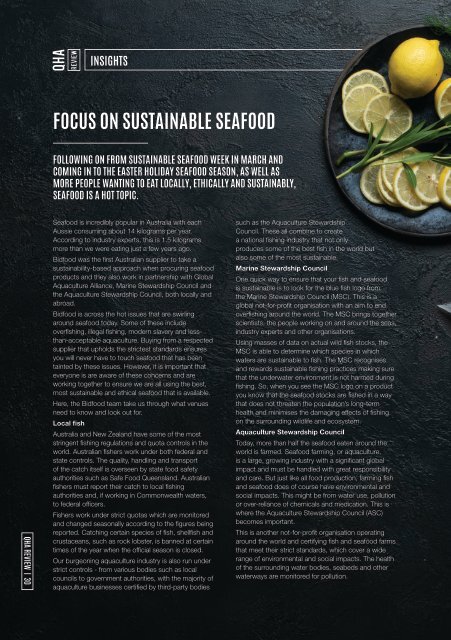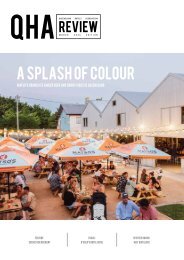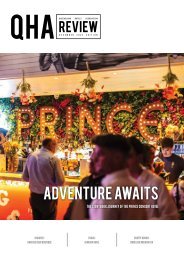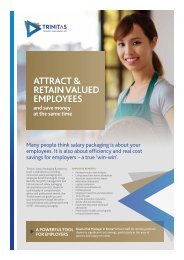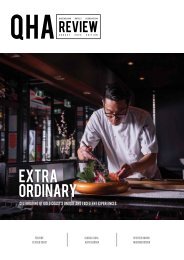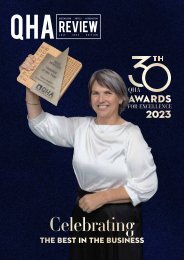QHA-Review_April_Digital
- No tags were found...
You also want an ePaper? Increase the reach of your titles
YUMPU automatically turns print PDFs into web optimized ePapers that Google loves.
INSIGHTS<br />
FOCUS ON SUSTAINABLE SEAFOOD<br />
FOLLOWING ON FROM SUSTAINABLE SEAFOOD WEEK IN MARCH AND<br />
COMING IN TO THE EASTER HOLIDAY SEAFOOD SEASON, AS WELL AS<br />
MORE PEOPLE WANTING TO EAT LOCALLY, ETHICALLY AND SUSTAINABLY,<br />
SEAFOOD IS A HOT TOPIC.<br />
<strong>QHA</strong> REVIEW | 30<br />
Seafood is incredibly popular in Australia with each<br />
Aussie consuming about 14 kilograms per year.<br />
According to industry experts, this is 1.5 kilograms<br />
more than we were eating just a few years ago.<br />
Bidfood was the first Australian supplier to take a<br />
sustainability-based approach when procuring seafood<br />
products and they also work in partnership with Global<br />
Aquaculture Alliance, Marine Stewardship Council and<br />
the Aquaculture Stewardship Council, both locally and<br />
abroad.<br />
Bidfood is across the hot issues that are swirling<br />
around seafood today. Some of these include<br />
overfishing, illegal fishing, modern slavery and lessthan-acceptable<br />
aquaculture. Buying from a respected<br />
supplier that upholds the strictest standards ensures<br />
you will never have to touch seafood that has been<br />
tainted by these issues. However, it is important that<br />
everyone is are aware of these concerns and are<br />
working together to ensure we are all using the best,<br />
most sustainable and ethical seafood that is available.<br />
Here, the Bidfood team take us through what venues<br />
need to know and look out for.<br />
Local fish<br />
Australia and New Zealand have some of the most<br />
stringent fishing regulations and quota controls in the<br />
world. Australian fishers work under both federal and<br />
state controls. The quality, handling and transport<br />
of the catch itself is overseen by state food safety<br />
authorities such as Safe Food Queensland. Australian<br />
fishers must report their catch to local fishing<br />
authorities and, if working in Commonwealth waters,<br />
to federal officers.<br />
Fishers work under strict quotas which are monitored<br />
and changed seasonally according to the figures being<br />
reported. Catching certain species of fish, shellfish and<br />
crustaceans, such as rock lobster, is banned at certain<br />
times of the year when the official season is closed.<br />
Our burgeoning aquaculture industry is also run under<br />
strict controls - from various bodies such as local<br />
councils to government authorities, with the majority of<br />
aquaculture businesses certified by third-party bodies<br />
such as the Aquaculture Stewardship<br />
Council. These all combine to create<br />
a national fishing industry that not only<br />
produces some of the best fish in the world but<br />
also some of the most sustainable.<br />
Marine Stewardship Council<br />
One quick way to ensure that your fish and seafood<br />
is sustainable is to look for the blue fish logo from<br />
the Marine Stewardship Council (MSC). This is a<br />
global not-for-profit organisation with an aim to end<br />
overfishing around the world. The MSC brings together<br />
scientists, the people working on and around the seas,<br />
industry experts and other organisations.<br />
Using masses of data on actual wild fish stocks, the<br />
MSC is able to determine which species in which<br />
waters are sustainable to fish. The MSC recognises<br />
and rewards sustainable fishing practices making sure<br />
that the underwater environment is not harmed during<br />
fishing. So, when you see the MSC logo on a product<br />
you know that the seafood stocks are fished in a way<br />
that does not threaten the population’s long-term<br />
health and minimises the damaging effects of fishing<br />
on the surrounding wildlife and ecosystem.<br />
Aquaculture Stewardship Council<br />
Today, more than half the seafood eaten around the<br />
world is farmed. Seafood farming, or aquaculture,<br />
is a large, growing industry with a significant global<br />
impact and must be handled with great responsibility<br />
and care. But just like all food production, farming fish<br />
and seafood does of course have environmental and<br />
social impacts. This might be from water use, pollution<br />
or over-reliance of chemicals and medication. This is<br />
where the Aquaculture Stewardship Council (ASC)<br />
becomes important.<br />
This is another not-for-profit organisation operating<br />
around the world and certifying fish and seafood farms<br />
that meet their strict standards, which cover a wide<br />
range of environmental and social impacts. The health<br />
of the surrounding water bodies, seabeds and other<br />
waterways are monitored for pollution.


